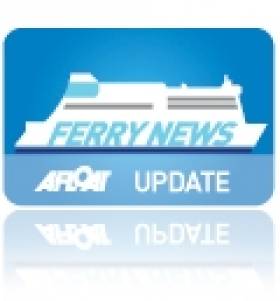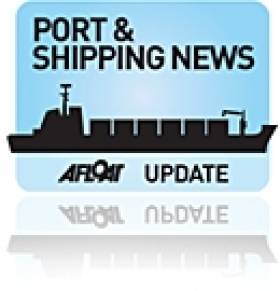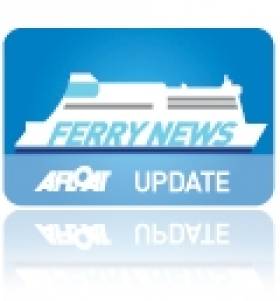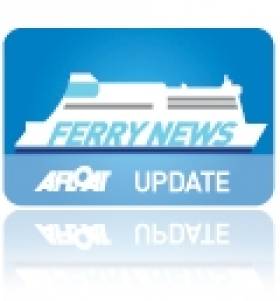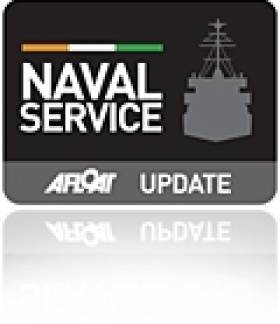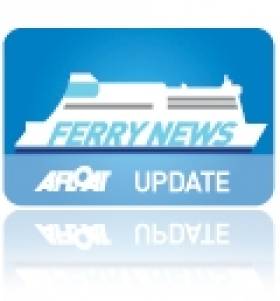Displaying items by tag: DublinHolyhead
Ferry Go-Round
# FERRY NEWS - Irish Ferries French routes cruiseferry Oscar Wilde (1987/31,914grt) took over Rosslare-Pembroke Dock sailings with this morning's sailing, instead of the usual route vessel that operates on the southern corridor route, writes Jehan Ashmore.
Currently there are no services running to Cherbourg until February, though Oscar Wilde is covering in for the Welsh route ferry Isle of Inishmore (1997/31,031grt). She in turn is due to relief Dublin-Holyhead sailings from tonight on the route which is normally served by flagship Ulysses (2001/50,938grt) which heads off for dry-docking.
In the meantime Isle of Inishmore is in Rosslare after completing last night's sailing from the Pembrokeshire port. She is due to make a repositioning voyage with an arrival into Dublin Port this evening and followed by a brief turn-around at the ferryport, she is take over the route's roster with tonight's 20.55 crossing to Holyhead.
New Telecoms Cable to Link-Up with London and Europe
# PORTS & SHIPPING -A specialist cable-laying vessel, Cable Innovator (1995/14,277 tonnes) arrived into Dublin Port yesterday. She is due start work next week on a €12.5m telecoms cable for CeltixConnect between Dublin and Holyhead.
According to a report in The Irish Times (click HERE) CeltixConnect's chief executive Diane Hodnett expected customers to start transmitting traffic on the cable at the end of January.
The cable will pass through the East Point Business Park in Dublin and on to the city's IFSC. On the Welsh side, the 131km cable will connect to the Welsh Assembly-funded Parc Cybi business park in Holyhead. From there it will connect to networks linking Manchester, London and the rest of Europe.
Capacity on the cable will be sold primarily to telecoms firms and ISPs, mobile phone operators and a small number of multinationals in the technology space which have massive bandwidth requirements.
For more information about the UK-flagged vessel which berthed in the port's Alexandra Basin, click this LINK.
Strong Winds Cancel Central Corridor Fast-Ferry Sailings
Stena Line's Dublin-Holyhead sailings are on schedule in addition to services on the Rosslare-Fishguard, Belfast-Stranraer (incl. HSS sailings) and Belfast-Liverpool. P&O's Dublin-Liverpool and North Channel Larne-Cairnryan route are also on schedule.
On the Celtic Sea, Fastnet Line's Cork-Swansea is unaffected as there are no sailings on Monday's, Tuesday's and Wednesday's during this month and November. The next sailing is this Thursday from Cork at 20.30hrs and returning Swansea on Friday at 21.30hrs.
According to Met Eireann, this afternoon will be extremely windy, especially across the southern half of the country, with southwest gusts of between 90 and 120km/h. For more detailed and updated weather forecasts visit www.met.ie
Stena Line to Reduce Dun Laoghaire-Holyhead Service
Stena Line said the fast craft service would operate until 13th September and would then be suspended until the 2012 season. Two conventional ferries will continue to operate year-round on the company's neighbouring route between Dublin Port and Holyhead.
Stena said it hoped to start the service again in April or May although no decision has been made on an exact date.
Area Director for Stena Line's business on the Irish Sea Michael McGrath said: "Despite all our attempts to reduce operating costs over the last few years, it has not been possible to return the route to profitability.
"We regret that this decision will have an impact amongst our ship's personnel and our port operations staff in Dun Laoghaire but this is a decision that has to be taken for the benefit of the overall business. We simply cannot continue to sustain these levels of financial losses.
"We will now embark on a period of consultation with our staff and their union representatives to discuss the implications of the proposed changes with them."
Stena says it hope to start the service again in April or May, although no decision has been made on an exact date. It is believed around 53 staff will be affected by the decision.
The operation was spearheaded by the ARW with the support of a Naval Service coastal patrol vessel (CPV) and also Air Corps helicopters. High-speed tactical assault craft with ARW teams on board conducted manoeuvres while air-borne teams fast-roped from helicopters onto the deck of the Stena Adventurer. To see photos of the ARW team in action click HERE.
The exercise was designed to enhance the capacity of the Defence Forces to provide the State with a highly specialised maritime armed intervention capability.
Last month the Naval Service conducted close quarter manoeuvres in 'Operation Quixote' off the south-west coast. The exercise involved the entire naval fleet except for the flagship LE Eithne, which performed in gunnery practice, simulated air attacks from the Air Corps and armed naval boarding parties.
HSS Sailings Resumed
The Stena Explorer had completed her first sailing from Holyhead yesterday morning, the fastcraft having departed the Welsh port at 10.00hrs.
Due to the technical difficulties, the Stena Explorer was not in a position to accommodate passengers on the return crossing, though the fastcraft did depart Dun Laoghaire 'light' (without passengers) at 18.45hrs for Holyhead.
The Stena Explorer resumed service with this morning's 10.00hrs sailing from Holyhead to Dun Laoghaire.
The re-introduction of the Stena Explorer is to provide greater capacity during the summer season compared to the smaller Stena Lynx III, which previously served the route until early January. The HSS will operate the two-hour route with a daily single round trip up to 13 Setember.


























